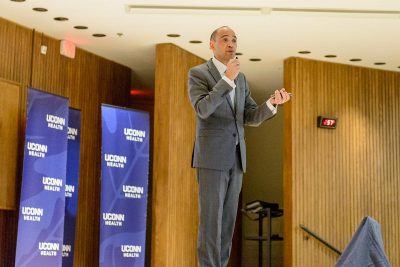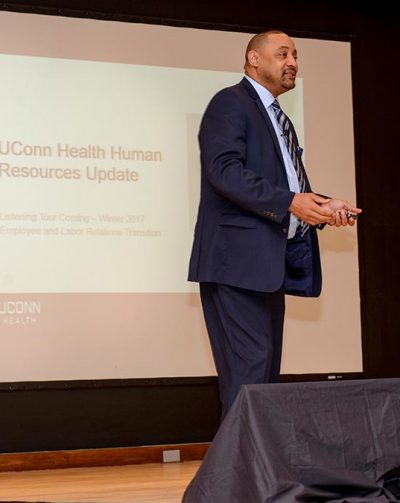
In the face of continued financial challenges, UConn Health still has great potential, Dr. Andrew Agwunobi, chief executive officer and executive vice president for health affairs, told employees at a town hall meeting this week.
“We have amazing, amazing opportunity here at UConn Health,” Agwunobi said. “We are investing for long-term growth, but have serious short- to mid-term financial headwinds.”
Agwunobi said UConn Health has to significantly cut costs while protecting its teaching, research, and clinical care missions, adding that details on how to do that are still being worked on and are forthcoming in the months ahead.
“One thing I can reassure you is that whatever we do in this organization, we will be very, very thoughtful about how it is done, and our mission,” he said. “We’ll be very thoughtful about that and make sure that it does not impact our mission, and does not impact people unnecessarily, wherever we can avoid that.”
He said understanding the context of those decisions is important, explaining that the budget target for fiscal 2018 is a nearly $16 million loss, and that the institution may have to overcome up to an additional $10 million in state funding cuts. At the same time, UConn Health must continue to invest in itself, he said.
“We have to continue the commitment to growth, there’s no way of shrinking ourselves to success,” Agwunobi said. “We have to grow, and we will continue to do that. We have to strengthen our surgical services—we really have to focus on that—our ORs, our outreach to physicians in the community, getting referrals into our systems, hiring faculty members in surgery, that’s very important.”
He noted that 73 faculty members have joined UConn Health since 2015, many of them clinicians.
“That’s our economic engine,” Agwunobi said. “We bring them in, they start up their practices, we give them equipment, we give them staff, and they see patients. Patients come to us and that’s how we increase out top line, our revenues.”
A video recording of the town hall meeting is available on Mediasite.
“On the one side we hire, we protect our mission, teaching and academic and clinical, and on the other side, we cut costs,” Agwunobi says. “And at the same time we look at affiliations and other structures, other partnerships that we can help to spread our costs, that we can help to increase the size of our network, that we can get more revenues into our system.”
Another priority is a focus on leadership and culture. Agwunobi cited results from last year’s employee engagement survey indicating areas in need of improvement. He said it starts with the leadership.
“We’ve started leadership development sessions, which I and others hold, and we actually have done three already,” he said. “What we’re focusing on is servant leadership. We’re here to serve the needs of the faculty, the patients, the employees, to have a culture of yes rather than a culture of no, to have a culture of supporting the people we are here to serve, being honest and proactive about communication, being good at what we do, being competent and continually learning as leaders, supporting our employees, and also being innovative.”
Agwunobi announced plans for a “360-degree survey,” where leaders will be evaluated anonymously by the people who report to them, as well as their peers.

Attendees of Wednesday’s meeting also got a public introduction to John Peeples, who joined UConn Health as vice president for human resources late last year. Peeples announced he will start holding small group meetings with front-line staff in work areas throughout the campus in March, April and May.
“I’ll go out and make sure that the employees have an opportunity to meet me, share with me things that are important to them, such as, how do we make this a great place to work,” Peeples said. “In addition to that, what are some of the programs and services that are important to the employees that we should consider as we look at HR and how HR is delivered to the workforce. More importantly, I just want to hear what people want to say—What do you want to share with me?”
An HR perspective survey will follow Peeples’ listening tour.
Peeples also said HR is undergoing a transformation toward having a greater focus on recruitment, retention, and training and development.
“Not only do we have to worry about the labor contracts and policies and corrective actions and those things, but we also have to be concerned about how we advocate for both managers and employees,” he said. “We need to be concerned with all rights that employees have, not just rights under a labor contract, but rights that you have to just have a great place to work.”
Also giving brief remarks were Dr. Bruce Liang, dean of the UConn School of Medicine, and Roberta Luby, associate vice president, UConn HealthONE.
Liang said the new medical school curriculum is going well, and the school getting ready for next year’s accreditation survey. He said the new simulation center is open to—and being used by—medical, dental, nursing and pharmacy students, and coming soon is a new suite for advanced training in laparoscopic surgery.
Luby, who is overseeing the elaborate transition to UConn Health’s new electronic medical records system, said the project is progressing well and is on track for an April 28, 2018, go-live date.
Save
Save